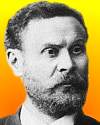
On 10 Aug 1896, Otto Lilienthal died, the German aeronautical engineer and inventor whose pioneering studies formed a foundation for Octave Chanute and the Wright brothers. With his brother, Gustav, Otto designed various gliders and made 2000 flights.
One of his glider designs featured bat-like wings, which folded for storage in a fashion similar to the bat. You can see illustrations and read a description of this invention in Lilienthal's U.S. Patent 544,816 which was issued on 20 Aug 1895, a year before his death. Although he had survived other crashes from his flights, but on 9 Aug 1896 he took his last fall from 56 feet, broke his spine, and died the following day.
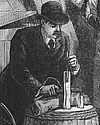
On 10 Aug 1859, the first full-time Inspector of Milk in the U.S. was one appointed by the city of Boston, Massachusetts. Although today, this might seem a quaint official position, in that era, the work of a milk inspector was of life-saving importance. It was a time when “swill milk,” was common, the poor, thin output of cows kept in unsanitary conditions and fed on distillery refuse. Contaminated milk was a serious public health hazard, sometimes deadly to infants. Even milk from healthier cows was often diluted, reducing its nutritional value. The Annual Report of the Boston Inspector of Milk (1871) gives a brief background to the establishment of the office of the Inspector of Milk. The web page includes the full image from which the thumbnail alongside here was taken, showing a milk inspector using a lactometer to test the density of milk to determine its purity.

“Take two aspirin and call me in the morning.” On 10 Aug 1897, Dr. Felix Hoffmann successfully created a chemically pure and stable form of acetylsalicylic acid, now taken for granted and known as aspirin. (Aspirin was its original trademarked name when first marketed.) Hoffman had been motivated to find a better pain reliever for his father's rheumatoid arthritis than the salicylic acid previously used which had an unpleasant taste and side effects, such as stomach bleeding. Today's book pick is: Aspirin : The Remarkable Story of a Wonder Drug, by Diarmuid Jeffreys. Aspirin is one of the most commercially successful products of all time. The author reveals the remarkable beneficial role of aspirin in host of conditions from Alzheimer’s to gum disease and as treatment for heart attacks, strokes, and even some types of cancers. The story of aspirin is one rich in dramatic twists and surprising discoveries, with a cast of surprising characters—from an American adventurer to an Oxfordshire parson, a forgotten Jewish scientist and an Australian advertising genius. Diarmuid Jeffreys follows this story from the drug's origins in ancient Egypt, through its industrial development at the end of the nineteenth century and its key role in the great flu pandemic of 1918 that killed more people than World War I.
It is available from Amazon, typically about Used from $3.38. (As of earlier time of writing - subject to change.)
 | To invent an airplane is nothing. To build one is something. But to fly is everything. |
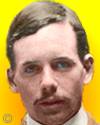 | The whole subject of the X rays is opening out wonderfully, Bragg has of course got in ahead of us, and so the credit all belongs to him, but that does not make it less interesting. We find that an X ray bulb with a platinum target gives out a sharp line spectrum of five wavelengths which the crystal separates out as if it were a diffraction grating. In this way one can get pure monochromatic X rays. Tomorrow we search for the spectra of other elements. There is here a whole new branch of spectroscopy, which is sure to tell one much about the nature of an atom. |
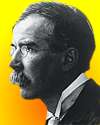 | The physician of the future will be an Immunisator. |
| Before you look at today's web page, see if you can answer some of these questions about the events that happened on this day. Some of the names are very familiar. Others will likely stump you. Tickle your curiosity with these questions, then check your answers on today's web page. | |
| Births | |
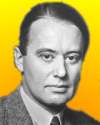 | Arne Tiselius, born 10 Aug 1902, was a Swedish biochemist who won the Nobel Prize for Chemistry in 1948 for his work on electrophoresis and other new methods of separating and detecting colloids and serum proteins. Using the technique on blood serum Tiselius confirmed the existence of four different groups of proteins - albumins and alpha, beta, and gamma globulins. What is electropheresis? |
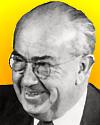 | Charles Darrow, born 10 Aug 1889, invented a classic board game. Can you name this game? |
| Deaths | |
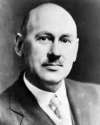 | A physicist (1882-1945) became known as the father of modern American rocketry. Can you name this pioneer? |
 | On 10 Aug 1915, Henry Moseley died at age 27. He had experimentally demonstrated that the major properties of an element are determined by the atomic number, not by the atomic weight, and firmly established the relationship between atomic number and the charge of the atomic nucleus. What was his cause of death. that prematurely ended his promising research career? |
| Events | |
 | On 10 Aug 1846, an Act of Congress signed by President James Polk established a trust to administer the generous bequest of James Smithson, of more than $500,000. In 1826, James Smithson, a British scientist, drew up his last will and testament, naming his nephew as beneficiary. He stipulated that, should the nephew die without heirs (as he would in 1835), the estate should go “to the United States of America, to found … an establishment for the increase and diffusion of knowledge among men. What name did he specify for this scientific establishment, by which it is known today? |
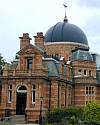 | On 10 Aug of a certain year, King Charles II laid the foundation stone of the Royal Observatory, Greenwich, England. In which century did this take place? |
Fast answers for the previous newsletter for August 9: Swiss • Count Amedeo Avogadro • Sir Edward Frankland • barbed wire • Alabama • Nagasaki.
 If you enjoy this newsletter, the website, or wish to offer encouragement or ideas, please send feedback by using your mail reader Reply button.
If you enjoy this newsletter, the website, or wish to offer encouragement or ideas, please send feedback by using your mail reader Reply button. Your click on a Facebook, StumbleUpon, or other social button on the site webpages is also a welcome sign of appreciation. Thank you for using them.
© This newsletter is copyright 2020 by todayinsci.com. Please respect the Webmaster's wishes and do not put copies online of the Newsletter — or any Today in Science History webpage. (If you already have done so, please remove them. Thank you.) Offline use in education is encouraged such as a printout on a bulletin board, or projected for classroom viewing. Online, descriptive links to our pages are welcomed, as these will provide a reader with the most recent revisions, additions and/or corrections of a webpage. For any other copyright questions, please contact the Webmaster by using your mail reader Reply button.
--
If you do not want to receive any more newsletters, Unsubscribe
To update your preferences and to unsubscribe visit this link
Executive Real Estate Business Class
-
"It was like a man with wings. It wasn't like anything you'd see on TV or in a monster movie." ...
About the publisher
Search This Blog
Blog Archive
-
▼
2021
(585)
-
▼
August
(32)
- Newsletter for Tuesday 31 August.
- Newsletter for Monday 30 August.
- Newsletter for Sunday 29 August.
- Newsletter for Saturday 28 August.
- Newsletter for Friday 27 August.
- Newsletter for Thursday 26 August.
- Newsletter for Wednesday 25 August.
- Newsletter for Tuesday 24 August.
- Newsletter for Monday 23 August.
- All-New Tonight: 'The Machines That Built America'
- Newsletter for Sunday 22 August.
- Newsletter for Saturday 21 August.
- Newsletter for Friday 20 August.
- Newsletter for Thursday 19 August.
- Newsletter for Wednesday 18 August.
- Newsletter for Tuesday 17 August.
- Newsletter for Monday 16 August.
- Newsletter for Sunday 15 August.
- Newsletter for Saturday 14 August.
- Newsletter for Friday 13 August.
- Newsletter for Wednesday 11 August.
- Newsletter for Tuesday 10 August.
- Newsletter for Monday 9 August.
- All-New Tonight 9/8c: Telephone Wars
- Newsletter for Sunday 8 August.
- Newsletter for Saturday 7 August.
- Newsletter for Friday 6 August.
- Newsletter for Thursday 5 August.
- Newsletter for Wednesday 4 August.
- Newsletter for Tuesday 3 August.
- Newsletter for Monday 2 August.
- Newsletter for Sunday 1 August.
-
▼
August
(32)
-
Blogroll
-
About
HistoryFact










0 comments:
Post a Comment